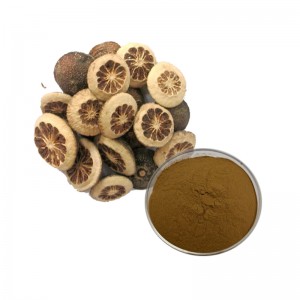The introduction of Citrus Aurantium
Citrus Aurantium, a plant belonging to the rutaceae family, is widely distributed in China. Citrus aurantium is the traditional Chinese name for lime. In traditional Chinese medicine, citrus aurantium is a traditional folk herb that is mainly used to increase appetite and regulate qi (energy). In Italy, citrus aurantium has also been a traditional folk remedy since the 16th century, used to treat fever such as malaria and as an antimicrobial agent. Recent studies have shown that citrus aurantium can replace ephedra in the treatment of obesity without adverse cardiovascular side effects.
The effective constituent of the citrus aurantium are hesperidin, neohesperidin, nobiletin, auranetin, aurantiamarin, nuringin, synephrine, limonin.
Active ingredient
hesperidin, neohesperidin, nobiletin, D-limonene, auranetin, aurantiamarin, citrin, synephrine, limonin
Physical property
Crystallization, melting point 184-1850C, carbonate crystallization 151-152, easily soluble in water. Bitartrate, melting point 188-189, soluble in water, difficult to dissolve in ethanol, almost insoluble in chloroform, ether. Hydrochloride, colorless crystal (ethanol-ethyl ether), melting point 166-167. The racemization is easy to occur in the chromatography separation of strong acid and base ion exchange resins.
Pharmacological effect
1. Effect on the uterus: Fructus Aurantii and Fructus Aurantii Fructus Decoction from three different producing areas (Sichuan, Jiangxi, and Hunan) showed an inhibitory effect on uterus in vitro of mice (pregnant and non-pregnant); The rabbit uterus was excited both in vivo and in vitro (pregnant and not pregnant). Rabbit uterine fistula also proved to make uterine contractions strong, increased tension, and even tetanic contraction. Fructus Aurantii tincture and Fructus Aurantii fluid extract can also excite rabbit uterus (in vivo and in vitro). Mouse uterus (in vitro) was inhibited. An alkaloid substance isolated from Fructus Aurantii and Lycium orange also had a certain contractile effect on rabbit uterus in vitro, especially on the uterine muscle excited by pituitrin. The part of the alkaloid removed had a relaxation effect on the rabbit uterus in vitro, and the relaxation effect of the uterus was more obvious after hypophysial excitation. Cirantin, isolated from Fructus Aurantii Fructus Peel, inhibits hyaluronate activity around the ovary, which may be related to its contraceptive effect (preventing fertilization).
2. Effect on the intestine: Fructus Aurantii and Fructus Aurantii from three different habitats inhibited the intestine in mice and rabbits; Most of the intestinal tubes in rabbits were inhibited, but few had no change. Fructus Aurantii and its fluid extract inhibited the intestinal tubes of mice (in vitro) and rabbits (in vitro). High concentration (1:1000) inhibited the small intestine of isolated rabbits and guinea pigs and inhibited the effects of acetylcholine and histamine. Low concentration (1:10 000), after a short period of inhibition, can show an excitatory effect, amplitude increased, and frequency accelerated. In anesthetized dogs, the presence of the intestine was inhibited obviously by decoctions. But for dogs with gastroenterostomy, it has a certain excitatory effect, which can make gastrointestinal movement and contraction rhythm powerful.
3. Effects on the heart and blood vessels: small amount of excitability and large amount of inhibition on the heart of toad in vitro. Fructus Aurantii and Fructus Aurantii Aurantii aqueous decoction, Fructus Aurantii tincture, and fluid extract are the same. Fructus Aurantii decoction or alcohol extract injected intravenously could result in significant pressor enhancement. Fructus Aurantii and Fructus Aurantii Fructus from three different habitats were proved to have mild vasoconstriction effects by whole-body vascular perfusion of toads. In anesthetized dogs, there was a significant and rapid hypertensive effect. There was no respiratory depression or hypotension caused by epinephrine, and there was no obvious increase in heart rate.
The pressure-boosting mechanism is related to the following factors:
3.1. Excitation of α receptors, causing vasoconstriction in some organs (phenylzoline can reverse pressure boost into an antihypertensive reaction).
3.2. Enhanced myocardial contraction and increased cardiac output (isolated guinea pig heart perfusion and cardiopulmonary preparation). After reserpine, the pressure-boosting effect of Fructus aurantii aurantii was more significant. It significantly increased coronary artery flow (289.4% increased coronary artery flow by bubble flowmeter) and increased brain and kidney blood flow by 86.4% and 64.5% on average, which were significantly different from norepinephrine. There was a decrease in femoral blood flow and a slight but insignificant increase in myocardial oxygen consumption, which did not coincide with a significant increase in coronary flow. In ECG tests in dogs and guinea pigs, arrhythmia (ventricular tachycardia or atrioventricular block) caused by a large dose of aurantii aurantii was not serious. Based on the above characteristics, it has been suggested to treat cardiogenic shock. Alkaloids isolated from Fructus Aurantii and Lycium orange can also temporarily enhance the tension of vascular smooth muscle, especially when treated with pituitrin.
4. Antithrombotic: In vitro test of 0.1g/ml Fructus Aurantii aqua decoction showed an obvious antithrombotic effect.
5. Anti-allergic reaction: 100mg/kg static pulse injection of Fructus Aurantii Aurantii water extract can inhibit passive skin allergic reaction (PCA) in rats, and 50μg/ml can inhibit histamine release from rat abdominal mast cells.
6. Other effects: Citrus plant mycin can reduce the content of cholestatin in the serum and liver of rats fed with a cholesterol-containing diet. The alcohol extract of Fructus Aurantii had an inhibitory effect on mycobacterium tuberculosis H37Rv in vitro, and its inhibitory concentration was 1:1000. Its aqueous decoction had no effect on guinea pig bronchus. It has been reported that citrus fruit juice increases the fermentation rate of yeast and does not decrease its activity after boiling, so it is not an enzymatic component. The main medical use of orange juice is that it is rich in vitamin C and contains A considerable amount of vitamins A and B. The peel does not contain vitamin C but is rich in vitamin A. It tastes bitter and can strengthen the stomach. Children such as taking a large number of peels can cause poisoning (abdominal pain, cramps).
Reference:http://www.a-hospital.com
For Citrus Aurantium Extract, please contact us. We are waiting for you here at any time!!!
Post time: Dec-15-2022







